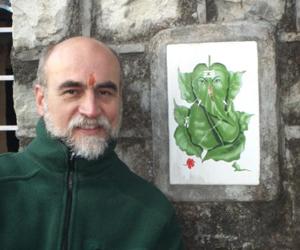Chris Chapple is Doshi Professor of Indic and Comparative Theology at Loyola Marymount University. He served as Assistant Director of the Institute for Advanced Studies of World Religions and taught Sanskrit, Hinduism, Jainism, and Buddhism for five years at the State University of New York at Stony Brook before joining the faculty at LMU. He has published more than a dozen books, including Karma and Creativity (1986) and several translations and editions of Indian texts, including the Yoga Sutra of Patanjali, the Bhagavad Gita, the Yogadrstisamuccaya of Haribadra, and the Prthivi Sukta section of the Atharva Veda. In 2013, Chris founded and currently directs the Master of Arts in Yoga Studies at LMU.
Sutra Journal interviewed him prior to his talk at the VedaMela 2015
Sutra Journal:
What initially led you into the field of South Asian studies and why did you decide to make a career out of it?
Christopher Key Chapple:
In grade school I had read many books about Asia and with Asian themes, including the King and I and The Secret Garden. In high school,
for social studies, I did a big project on Zen Buddhism and one on Yoga. I read the Tibetan Book of the Dead, Be Here Now, and the Discourses by Meher Baba, among others. When the first semester started at college (SUNY Buffalo) I signed up for a class chanting the Bhagavad Gita first semester. After meeting my teacher, Gurani Anjali, I transferred to Stony Brook on Long Island where I continued with
Sanskrit, started Tibetan language, and took a double major in Comparative Literature and Religious Studies. We had an excellent program in Asian
philosophy, anchored by Antonio deNicolas and David Dilworth.
The biggest challenge was reconciling Buddhist emptiness and no-self teachings with the consciousness and self-realization teachings found in Hindu
traditions and in Yoga. It took until the PhD dissertation to sort this out. So, my original specializations were in Hinduism and Buddhism, as well as
Tibetan and Sanskrit languages and theories of translation. After the PhD, I expanded into the fields of Jainism and helped establish the field of religion
and ecology.
Sutra Journal:
What led to the creation of the Yoga Masters program at LMU?

Christopher Key Chapple:
Back in the 1990s, Yoga experienced a resurgence in popularity, after a lull in the 1980s. My training, which took place in the 1970s and 1980s was
somewhat unique in that our community at Yoga Anand Ashram included many people pursuing higher studies at Stony Brook, Columbia, and Fordham. Our LMU
program started with some lectures and study groups in the early 1990s that attracted followers of Ammachi, Gurumayi, the Vedanta Society, the Sivananda
Center, the Shaiva Universal Fellowship: a very eclectic and ecumenical group. They truly appreciated the systematic study of the Yoga Sutra, which is held
in common by all traditions (even Buddhists and Jains). After suggesting a graduate program in Yoga Studies to one Dean, the idea was rejected. A few years
later, a different Dean responded by suggesting the start of certificate programs, which we began in 2002. After several years of robust enrollments, a
different university administrator suggested that we propose a graduate program. It took five years to obtain all the approvals and begin. We have
graduated one class, another one will complete the program in May, and we are admitting our fourth cohort.
Sutra Journal:
What are some of your favorite Indian metaphysical texts? Can you describe them briefly?
Christopher Key Chapple:
The Yogavasistha answers the debate regarding the tension between emptiness and consciousness in superbly poetic verse. The Yoga Sutra
pithily provides a meditation roadmap. The Bhagavad Gita deals with human agony, spiritual practice, ecstatic self-transcendence, and Apollonian
reintegration. The Mahabharata delves into every nook and cranny of the human psyche. The Tattvartha Sutra describes a fully alive
universe. The Satipatthana gives the basics on how to practice mindfulness.
Sutra Journal:
Is there an inherent unity in Dharma traditions? How is the concept of 'Self' different in Hindu, Buddhist and Jaina traditions?
Christopher Key Chapple:
There is difference between Dharma traditions, whether Advaita Vedanta (oneness with consciousness), Dvaita (God remains transcendent), Vishisthadvaita
(the world is suffused with consciousness), Samkhya (knowledge is the key to freedom), Yoga (self purification brings one to freedom), Buddhism (there is
no Self), Jainism (each soul has been troubled by karmas that must be purged). All these traditions agree that freedom is possible but do not agree about
how to describe it or how to go about getting there.
Sutra Journal:
How much time have you actually spent in India? Which are your favorite places and things to do?
Christopher Key Chapple:
The first trip to India was in 1981. Now I generally go for a couple of visits each year, with currently a month in the summer with graduate students.
Vandana Shiva's organic training farm, Navdanya, is remarkable and has what might be the best food on the planet. Siddhartha's Fireflies Ashram near
Bangalore has amazing adobe accommodations, fantastic art, and restored jungle. The aratis on the river each night in Rishikesh and Varansi are sublime.
The backwaters, mountains, and beaches of Kerala are breath taking. The Padmavati image at the Vallabh Jain Mandir in Alipur north of Delhi transports
one's soul into a place of deep beauty.
Sutra Journal:
Please recommend some books that made a big impact on you.
Christopher Key Chapple:
Little Women,
Louisa May Alcott. Three Pillars of Zen, Philip Kapleau. Ways of Yoga, Gurani Anjali. The Death and Rebirth of the Seneca,
Anthony Wallace. Evening Thoughts, Thomas Berry. The Yoga Sutra, Patanjali. The Yogavasistha. The Yogadrstisamuccaya.
The Mahabharata.